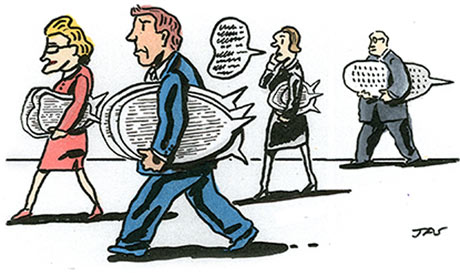David Cameron has had the cabinet table extended so more spads can fit around it. Wave goodbye to productivity at No 10

'Nobody really believes cabinet meetings affect anything. Their sole impact on the economy is driving sales of those plastic document folders that hide the text beneath them.' Illustration by Jas
If you want a sense of just how big David Cameron and his ideas are, then know this: a carpenter was recently ordered to build an extension to the cabinet table. A piece of furniture that has seen governments through for more than half a century has now been made even bigger, the better to accommodate the increasing number of people who don't make decisions around it.
To the annals of things that sound like rejected Thick of It plotlines, then, let us add the cabinet table thing. (One troubling irony of The Thick of It's success is what a crutch of Westminster life the show has become. The sheer volume of defeatist politicos who now explain away their days by saying "It was like an episode of The Thick of It" should really be satirised by an episode of The Thick of It.)
Anyway, a cabinet maker – appropriately – really has created a 4ft table extension to make room for all the extra ministers given attendance privileges, and all the special advisers and press officers and other bods who pitch up at 9am every Tuesday looking like they've won a competition to attend a cabinet meeting. (Second prize, to give the old joke a run-out, is attending two.)
It's going to be agony waiting out the 30-year rule to discover what someone's spad said about something that had been decided by some other people somewhere else some other time – but in the interim, I hope No 10 will embrace further advances in the modern science of meetingology. They could start having cabinet off-sites and cabinet awaydays. Perhaps one of Cameron's gurus could appropriate the word iCabinet and fashion a new governance gimmick around it.
It's hardly a new point, but nobody really believes cabinet meetings affect anything. Their sole impact on the economy is driving sales of those plastic document folders that hide the text beneath them. If cabinet attendees let photographers see their cabinet notes, then they might not be allowed to come to cabinet any more.
Yet the cabinet is merely a Westminster example of the meeting malaise that increasingly grips the world. Last month an admittedly non-scientific survey claimed that the average office worker spends more than 16 hours a week in meetings. The average civil servant spends 22, with both public and private sector respondents deeming significant percentages of these meetings to be utterly pointless.
In olden times, one of the best things about print journalism was that there were scarcely any meetings at all, because it seemed to everyone there wasn't time. There was one in the morning, where people took a briskly critical look through that morning's paper before deciding what to put in tomorrow's. And then everyone went off and did it. For most of my colleagues, alas, those days are gone. My own weird job – lancing my brain with a keyboard, basically – is one of the few that requires almost no meetings at all. I count myself one of the luckiest people alive. Friends with non-media occupations often tell me that they are required to attend so many meetings that they wonder when on earth they're supposed to do their actual job. In a surreal non-productive way, the meeting has almost become the job.
Indeed, I'm told by some that the higher up you get in the world of meetings, the more stage-managed they are. Decisions aren't made there: they're just ratified. The old "information sharing" justification is apparently cobblers too, because if you have to wait till the meeting to get the information, then you're really not relevant enough to be at the meeting.
What the vast majority of meetings do is confer status on those blowhards "leading" them, or attendees who really should find other ways to validate themselves. Even Cobra – the snazzy-sounding Whitehall crisis response meeting – is widely griped about, with Scotland Yard's formerly most senior anti-terrorism officer complaining it was "cumbersome and bureaucratic", full of people "jockeying for position", and slowed everything down.
But on people go. Gazillions of meetings are held every day, with every one presumably regarded as an indispensable step toward something worth attaining. What would winning the game of meetings even look like? I suppose you'd battle up all the levels, and finally ascend to the ultimate meeting: one to which you'd actually want to go to. Maybe you'd get in on the Meeting of Meetings, which would be something like that meeting where Obama and Hillary and the joint chiefs watched Osama bin Laden's compound being stormed live. But was that really a meeting? In the photos it looked so passive as to be more like a movie night.
As a last word on meetings, I keep thinking of that radical Dutch urban planner who did away with all traffic lights in various towns, and found road safety dramatically improved. If only, instead of making fatuous interventions on some footballer's disciplinary breach Cameron did something similarly useful with his time. Imagine if he could announce that for one week – in fact, make it a month – all meetings in all workplaces in all Britain were to be banned. People would simply have to muddle through, reclaiming the civilised mores of a time before the answer to everything was to have a meeting. Who knows, a meetingless Britain might even prove that holy of holies for George Osborne – the entirely free initiative that would significantly boost the economy.

No comments:
Post a Comment